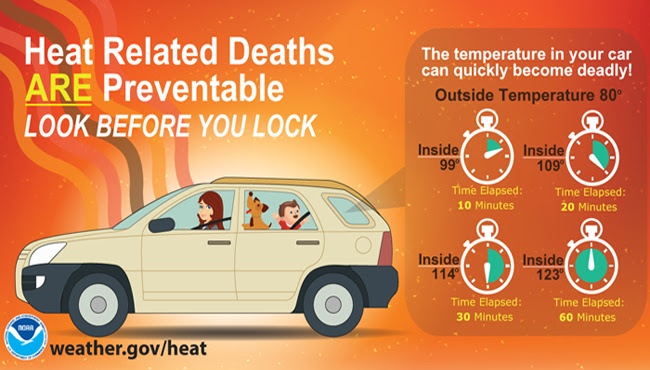DMV urges parents, caregivers, pet owners to “look before you lock”
In 2020, 24 children in the United States died as a result of being left in an unattended hot vehicle, according to the National Highway Traffic Safety Administration (NHTSA). As temperatures begin to climb, the Virginia Department of Motor Vehicles (DMV) urges parents and caregivers to never leave children unattended in a vehicle – even for a minute – no matter the temperature.
When the outside temperature is 80 degrees, a car can heat up to 100 degrees in just 10 minutes. Parking in the shade and rolling down the car’s windows have little effect on inside temperature, and as time goes by the temperature rises. Children have died from heatstroke in cars when outside temperatures were as low as 60 degrees.
“As the weather is warming up in the Commonwealth and we are traveling more frequently, we need to establish habits that will help keep our children and pets safe when we get out of our vehicles,” said DMV Commissioner Richard D. Holcomb, the Governor’s Highway Safety Representative. “All hot car deaths are preventable and we – as parents, caregivers, and bystanders – have a responsibility to keep those more vulnerable to heatstroke safe.”
Both children and pets are especially prone to being harmed by heatstroke. Children heat up three-to-five times faster than adults, according to kidsandcars.org. Pets cannot sweat like humans; they can only cool down through panting, according to the Humane Society of the United States. High temperatures can cause irreparable organ damage in pets and even death.
A good rule of thumb is to always “look before you lock,” NHTSA says. Drivers are encouraged to check the back seats of their vehicle before locking it and walking away. A helpful reminder may be to keep a stuffed animal or pet’s toy in the back seat when it’s empty, and move it to the front seat as a visual reminder when a child or pet is in the back seat.
Additionally, caregivers should be mindful of the dangers of heat when traveling with the elderly. As people age, it becomes more difficult to regulate temperature and the ability to sweat decreases, making the elderly more at risk of heatstroke than younger adults, according to the National Institutes of Health.


